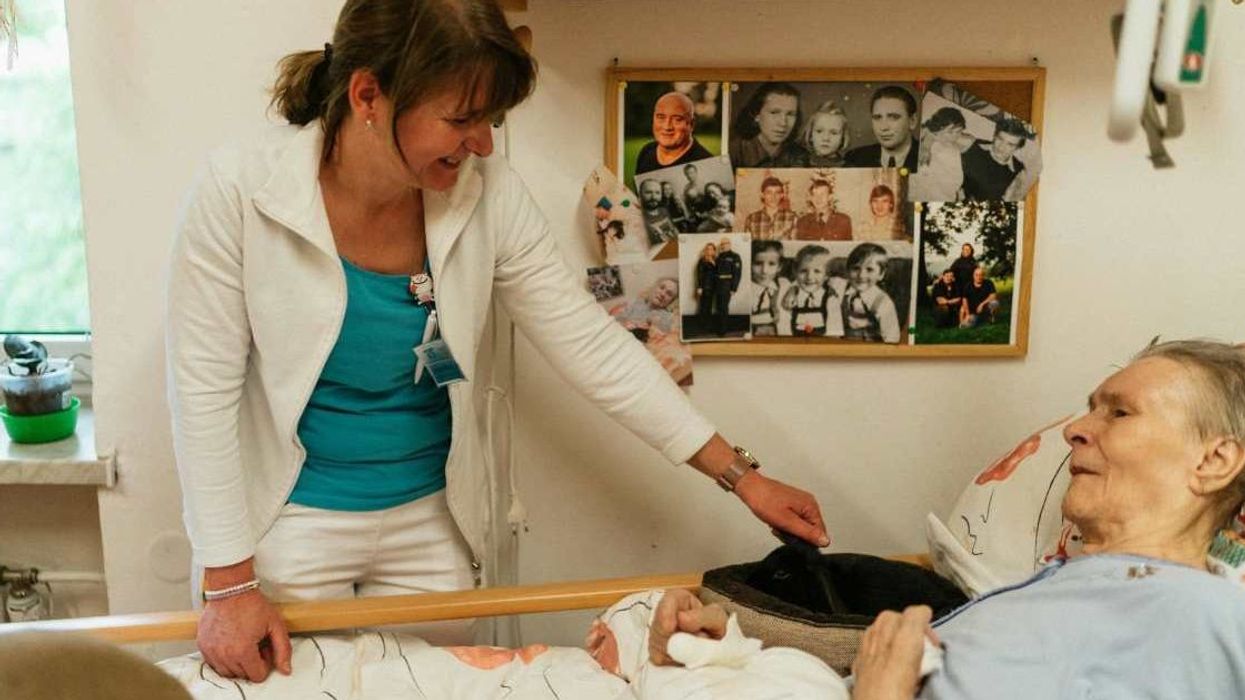Laurie Itkin met her husband Dan on Match.com when she was 35 years old. He was 41. After dating for about eight months, they bought a house together in San Diego. They lived together for a few years before Dan decided he wanted Laurie to take a more active role in parenting his 10-year-old daughter from a previous marriage. Laurie was open to the idea, even excited, but didn’t feel comfortable doing so unless they were legally married. They agreed to make it legal, but Laurie had one stipulation: She wanted a prenup.
Prenuptial agreements are famously unromantic financial contingency plans—binding contracts signed before marriage, establishing the property of each spouse should the marriage end in divorce. A prenup stipulates how assets will be divided, what the financial responsibility of each will be, whether one will owe the other alimony, and more. Sometimes, prenups also include behavioral clauses, outlining financial ramifications if, for example, one spouse cheats on the other. Sandra Bullock and Jesse James famously signed a prenup that stated he would get no money if he cheated on her—a fortuitous stroke of foresight on Bullock’s part, as it turned out.
Laurie wanted a prenup to protect her assets. At the age of 24, she received a $1,600 inheritance. That may not sound like much, but Laurie had spent 15 years living below her means building that small nest egg into a $1 million dollar investment portfolio—all before Dan came into the picture.
[quote position="full" is_quote="true"]The thought that I would have to subsidize a man if our marriage didn't work out made me very scared.[/quote]
“I made great sacrifices. I lived like a perpetual college student so I could achieve financial security,” Laurie says. “The thought that I would have to subsidize a man if our marriage didn't work out made me very scared. He didn't share those sacrifices.”
Laurie isn’t alone, either. Prenups are five times more common today than they were 20 years ago. In the immortal words of Kanye West: “If you ain’t no punk/ Holla, ‘We want prenup!” (Though he ain’t saying she’s a gold digger.) The term gold digger implies prenups are something rich men use to protect themselves against women who want their money—and, for women, they are often a signal that their partners don’t trust them. But today’s young people, after seeing many of their parents get divorced, are opting for prenups for much more practical reasons.
Money is still the primary asset divided in prenups, but the tired Kanye narrative that it’s always men protecting their money from women is no longer accurate. These days, 20- and 30-somethings are getting married with more acquired and inherited wealth than previous generations—about $30 trillion dollars from their baby boomer parents—so they want to protect it should something go wrong. While some are inheriting vast amounts of money, others are entering marriage with vast amounts of debt. (Young people owe $1.3 trillion nationwide in student debt.) Some millennials are also entering marriage with shared business interests. And prenups stipulate in advance how shares and stock are to be divided when a couple owns a company together.
Prenups also offer benefits that are more intangible: an assurance that couples are getting married for the right reasons. Though 22-year-old Jenna Shnayerson is not yet married, she already knows she wants a prenup to “completely take money off the table.” Tyler and Lindsey, set to marry next year, agree with this philosophy: They would rather ensure their marriage isn’t about money. “In our minds a prenup doesn’t change anything; we fell in love because we care about each other,” says Tyler.
In the course of their 10-year marriage, Laurie and Dan have found that their prenup has made their relationship more secure. “We've had very few conflicts about money. We have a joint account for household expenses and individual accounts for personal expenses. As a symbolic gesture, he deposits an extra monthly $200 in the joint account, since his daughter lived with us half time (then eventually full time). In return, I funded a 529 college savings account for her.”
As a financial analyst, Laurie recommends prenups for most of today’s young couples. The exercise of documenting all your assets and debts before marriage sets an important foundation for financial intimacy, she explains, and that could help mitigate future fights over money. “If you don't consider a prenup,” she warns, “you are agreeing to comply with your state's law if you get divorced. If you don't like how your state addresses asset division and child and spousal support, then get a prenup.”
Other financial experts agree. Terry Savage, a financial columnist, is pro prenup because it requires transparency around finances: All assets are disclosed and it forces couples to formalize their plans for the future. Experts recommend that couples with real estate or business holdings, significant financial assets, student debt, or the intention to go back to school strongly consider a prenup. But, in the end, it’s all about your comfort level. The ultimate factor in this decision should be whether it feels right to you and your partner.



















 Representative Image Source: Pexels | Olly
Representative Image Source: Pexels | Olly Representative Image Source: Pexels | Pixabay
Representative Image Source: Pexels | Pixabay Representative Image Source: Pexels | Cottonbro
Representative Image Source: Pexels | Cottonbro Representative Image Source: Pexels | Cottonbro
Representative Image Source: Pexels | Cottonbro Representative Image Source: Pexels | Karolina Grabowska
Representative Image Source: Pexels | Karolina Grabowska Representative Image Source: Pexels | Jonathan Borba
Representative Image Source: Pexels | Jonathan Borba Image Source: Reddit |
Image Source: Reddit |  Image Source: Reddit |
Image Source: Reddit |  Image Source: Reddit |
Image Source: Reddit | 
 Representative Image Source: Pexels | Pixabay
Representative Image Source: Pexels | Pixabay Representative Image Source: Pexels | Pixabay
Representative Image Source: Pexels | Pixabay Representative Image Source: Pexels | markus winkler
Representative Image Source: Pexels | markus winkler
 Representative Image Source: Pexels | Shvets Production
Representative Image Source: Pexels | Shvets Production Representative Image Source: Pexels | Oleksandr P
Representative Image Source: Pexels | Oleksandr P Representative Image Source: Pexels | Photo by Spencer Selover
Representative Image Source: Pexels | Photo by Spencer Selover Representative Image Source: Pexels | JSME Mila
Representative Image Source: Pexels | JSME Mila
 Representative Image Source: Wellington boots in a row in hallway (Getty Images)
Representative Image Source: Wellington boots in a row in hallway (Getty Images) Image Source: Writer Terry Pratchett Pointing to His Book (Photo by Rune Hellestad/CORBIS/Corbis via Getty Images)
Image Source: Writer Terry Pratchett Pointing to His Book (Photo by Rune Hellestad/CORBIS/Corbis via Getty Images)
 Representative Image Source: Pexels| RDNE Stock Project
Representative Image Source: Pexels| RDNE Stock Project Representative Image Source: Pexels| Satoshi Hirayama
Representative Image Source: Pexels| Satoshi Hirayama Image Source: TikTok|
Image Source: TikTok| Image Source: TikTok|
Image Source: TikTok|